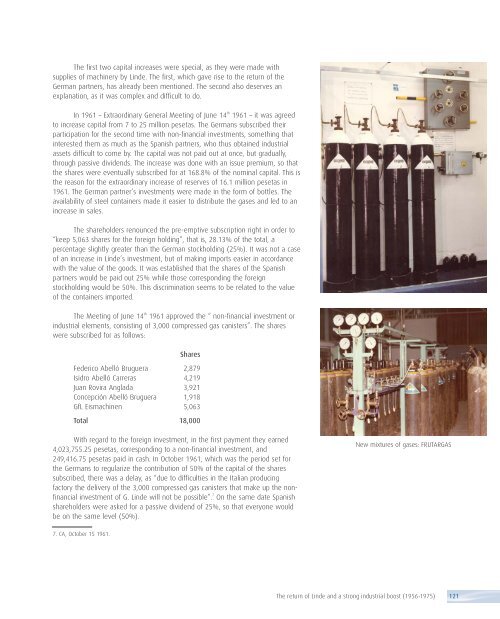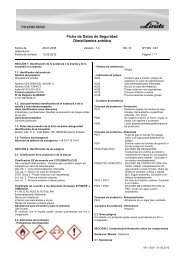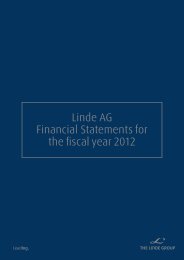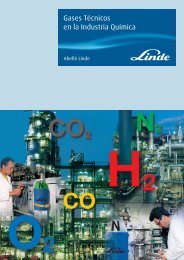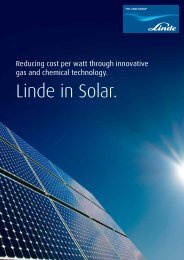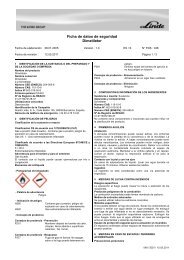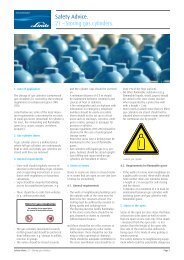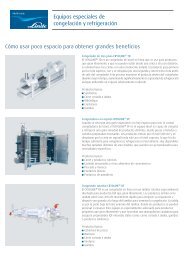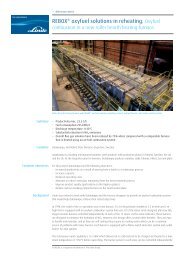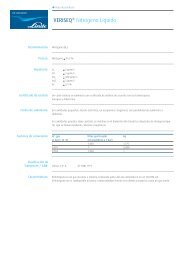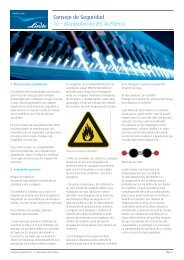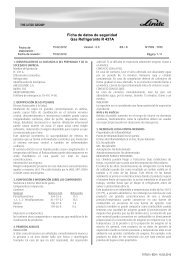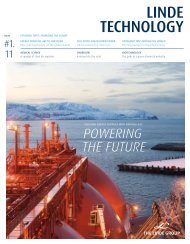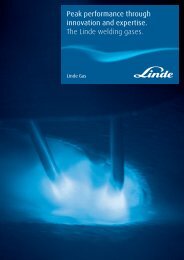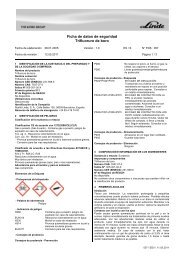Abelló Linde Centenary Book
Abelló Linde Centenary Book
Abelló Linde Centenary Book
Create successful ePaper yourself
Turn your PDF publications into a flip-book with our unique Google optimized e-Paper software.
The first two capital increases were special, as they were made with<br />
supplies of machinery by <strong>Linde</strong>. The first, which gave rise to the return of the<br />
German partners, has already been mentioned. The second also deserves an<br />
explanation, as it was complex and difficult to do.<br />
In 1961 – Extraordinary General Meeting of June 14 th 1961 – it was agreed<br />
to increase capital from 7 to 25 million pesetas. The Germans subscribed their<br />
participation for the second time with non-financial investments, something that<br />
interested them as much as the Spanish partners, who thus obtained industrial<br />
assets difficult to come by. The capital was not paid out at once, but gradually,<br />
through passive dividends. The increase was done with an issue premium, so that<br />
the shares were eventually subscribed for at 168.8% of the nominal capital. This is<br />
the reason for the extraordinary increase of reserves of 16.1 million pesetas in<br />
1961. The German partner’s investments were made in the form of bottles. The<br />
availability of steel containers made it easier to distribute the gases and led to an<br />
increase in sales.<br />
The shareholders renounced the pre-emptive subscription right in order to<br />
“keep 5,063 shares for the foreign holding”, that is, 28.13% of the total, a<br />
percentage slightly greater than the German stockholding (25%). It was not a case<br />
of an increase in <strong>Linde</strong>’s investment, but of making imports easier in accordance<br />
with the value of the goods. It was established that the shares of the Spanish<br />
partners would be paid out 25% while those corresponding the foreign<br />
stockholding would be 50%. This discrimination seems to be related to the value<br />
of the containers imported.<br />
The Meeting of June 14 th 1961 approved the “ non-financial investment or<br />
industrial elements, consisting of 3,000 compressed gas canisters”. The shares<br />
were subscribed for as follows:<br />
Shares<br />
Federico Abelló Bruguera 2,879<br />
Isidro Abelló Carreras 4,219<br />
Juan Rovira Anglada 3,921<br />
Concepción Abelló Bruguera 1,918<br />
GfL Eismachinen 5,063<br />
Total 18,000<br />
With regard to the foreign investment, in the first payment they earned<br />
4,023,755.25 pesetas, corresponding to a non-financial investment, and<br />
249,416.75 pesetas paid in cash. In October 1961, which was the period set for<br />
the Germans to regularize the contribution of 50% of the capital of the shares<br />
subscribed, there was a delay, as “due to difficulties in the Italian producing<br />
factory the delivery of the 3,000 compressed gas canisters that make up the nonfinancial<br />
investment of G. <strong>Linde</strong> will not be possible”. 7 On the same date Spanish<br />
shareholders were asked for a passive dividend of 25%, so that everyone would<br />
be on the same level (50%).<br />
New mixtures of gases: FRUTARGAS<br />
7. CA, October 15 1961.<br />
The return of <strong>Linde</strong> and a strong industrial boost (1956-1975) 121


